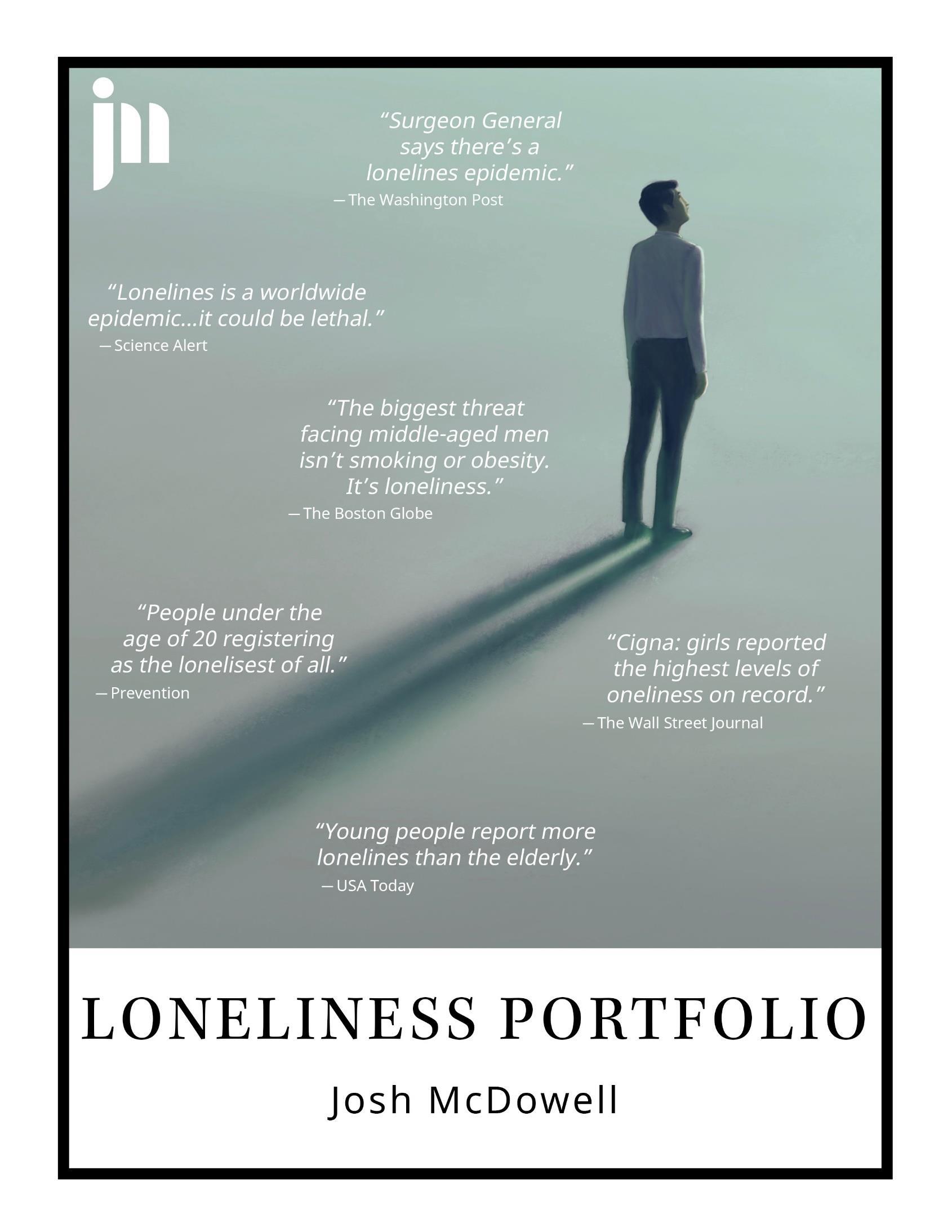
39 minute read
Loneliness Portfolio
by Josh D. McDowell
Loneliness had become a growing epidemic itself. For those who live alone, it is nothing short of isolating.
Advertisement
Poet John Milton pointed out that “Loneliness is the first thing which God’s eye named not good.” When God surveyed His creation at the dawn of human history. He declared,
1. “It is not good for man to be alone. I will make a helper suitable for him” (Gen. 2:18).
2. He knew that His crowning creation would need companionship and fellowship.
With the creation of Eve, God met that need. When the first humans sinned, however, a wedge was driven – for the first time – between them and God, and husband and wife. Sin entered the world – and with it, conflict, selfishness and loneliness.
The following research addresses the loneliness issue outside as well as within the Church environment. The affects are tremendous both among believers and non-believers and need to be addressed at this crucial time.
Loneliness is not a Quirk
(All these headlines were published before the COVID-19 pandemic)
• Surgeon General Says There’s a Loneliness Epidemic. (The
Washington Post)
• “Loneliness is a worldwide epidemic … it could be lethal.” (Science Alert)
• “Young People Report More Loneliness than the Elderly.” (USA
Today)
• Cigna: “girls reported thehighest levels of loneliness on record.” (The Wall Street Journal)
• “The Biggest Threat facing Middle-aged Men Isn’t Smoking or
Obesity. It’s Loneliness.” (The Boston Globe)
• “People under the age of 20 registering as the loneliest of all.” (Prevention)
• “The Surprising Effects of Loneliness on Health.” (The New York
Times)
• “Loneliness Begets More Loneliness.”(The Atlantic)
• “How Social Isolation is Killing Us.” (The New York Times)
• “Social Isolation Kills More People than Obesity.” (Slate)
The Loneliness Crisis on U.S. College Campuses
by
Varun Soni
Dean of Religious Life
at
University of So. California
LA Times Op Ed July 14, 2019
M.T.S. from Harvard Divinity School; M.A. from The University of California, Santa Barbara; J.D. from the University of California, Los Angeles; PhD from the University of Cape Town
“When I arrived at USC 11 years ago as dean of religious life, my pastoral conversations with students mostly focused on their quests for meaning and purpose. They were striving to translate values into action, cultivate joy and gratitude, live extraordinary lives.”
“But over the last several years, these conversations have taken a devastating turn. Whereas students used to ask, ‘How should I live?’ they are now more likely to ask, ‘Why should I live?’ Where they used to talk about hope and meaning, now they grapple with hopelessness and meaninglessness. Every year, it seems, I encounter more stress, anxiety and depression, and more students in crisis on campus.”
“My colleagues at other universities say they are seeing the same distressing trend, and research backs up our observations.”
“According to the Center for Collegiate Mental Health, the increase in utilization rates for counseling centers across the country over the last five
years has greatly outpaced the increase in student enrollment, and as a result, schools have trouble hiring enough mental health counselors to keep up with growing demand.”
“The most recent Healthy Minds Survey, an annual report on mental health on college and university campuses, found that one-third of undergraduate students in the United States wrestle with some kind of mental health issue, while more than 10% struggle with thoughts of suicide.”
“The Cooperative Institutional Research Program’s large annual survey of college freshmen has noted a marked and steady downward trend in the self-reported emotional health of students along with a large uptick in selfreported feelings of being overwhelmed.”
“What I have noticed in my work with students is that many of them face the same hidden root challenge: loneliness. According to a recent survey by the global health service company Cigna, the loneliest generation in the United States today is not the oldest Americans but the youngest, specifically young adults between 18 and 22 years old.”
“I never got the question in my first five years at USC that I now get almost daily from students: ‘How do I make friends?’ Students may have thousands of friends online, but few in real life; they may be experts at talking with their thumbs, but not so much with their tongues. As a result, many feel as though they don’t have a tribe or a sense of belonging. They feel disconnected from what it means to be human.”
“While it is now fashionable to refer to this cohort of college and university students as a coddled generation of ‘snowflakes,’ the reality is they face unprecedented challenges and circumstances.”
“They are entering a world in which many of the career paths of their parents’ generation no longer exist or have changed drastically. They face escalating tuition costs with little sense of whether their future opportunities justify the outlay. They have participated in active-shooter trainings and campus lockdown drills for most of their lives.”
“And according to the Pew Research Center’s Forum on Religion and Public Life, more than one-third of young adults are now disaffiliated with religion, marking a dramatic generational shift away from religion and from the comfort and community that it can provide.”
“The convergence of these factors and realities has directly contributed to a crippling sense of anxiety and alienation in students across the country.”
“But today’s students are also creative and courageous, engaged and empathetic, diverse and inclusive. They are hardworking and goal oriented. It needs to be the job of colleges and universities to help students develop resources that enable them to thrive and flourish mentally, emotionally and spiritually, so that they may fulfill their academic aspirations and achieve their professional goals.”
“At USC, we’re trying a variety of things, including a dedicated mindfulness training app and free mindfulness programs that reach more than 7,000 people a year. A new, for-credit freshman course called Thrive focuses on emotional intelligence, healthy relationships, self-care, resiliency and human flourishing. In the fall, we will debut our new artificial intelligence well-being assistant, named Ari , which will guide students to appropriate support resources and communities on campus.”
“We also offer and host yoga classes, drum circles, friendship courses, community teas, coloring sessions, laughing groups, sleep classes, connection workshops, meditation retreats, campfire conversations and primal scream opportunities. We’ve recently appointed our first director of belonging , while our full-time wellness dog, Professor Beauregard Tirebiter (affectionately known as ‘Beau’) strolls the campus daily.”
“Colleges and universities have always had a responsibility to develop the whole student so that our young people are able to make not just a living, but a life. Today, that means examining a new range of challenges that students face and developing a new approach to well-being on campus. By doing so, colleges and universities can help empower students to transform the world by transforming themselves.”
“Varun Soni is dean of religious life at USC, where he also serves as vice provost of campus wellness and crisis intervention.”
(Varun Soni, “There’s a loneliness crisis on college campuses”, LA Times, July 14, 2019, https://www.latimes.com/opinion/op-ed/la-oe-soni-campusstudent-loneliness-20190714-story.html)
Why are so Many Young People Unhappy? 12.21.2020
“Reuters reported in 2019 that ‘Suicidal thinking, severe depression and rates of self-injury among U.S. college students more than doubled over less than a decade.’”
“And unhappiness is hardly confined to Americans. As the social commentator Kay Hymowitz recently wrote, ‘Germans are lonely, the bon
vivant French are lonely, and even the Scandinavians . . . are lonely. The British prime minister . . . recently appointed a ‘Minister of Loneliness.’”
“In the U.S., People have more money, better health, better housing, more education, and live longer than at any time in history, but people— especially the young—are unhappier than at any time since data began to be collected.”
“The biggest reason is the loss of values and meaning.”
“…more than a third of Americans born after 1980 affiliate with no religion. This is unprecedented in American history. And it’s even worse in Europe.”
“Association, 2016 JAMA Psychiatry, found that American women who attended a religious service at least once a week were five times less likely to commit suicide. And common sense suggests this applies to men as well.”
“Why are so many young people depressed, unhappy, and angry? … It’s having no religion, no God, and no country to believe in.”
(Dennis Prager, “Why Are so Many Young People Unhappy”, PagerU, March 2, 2020, https://www.prageru.com/video/why-are-so-many-youngpeople-unhappy/)
Lockdown Loneliness: COVID-19 Quarantine has Quarter of Adults Feeling Like They have no Friends
1. “…four in ten people experience days without talking to a single person.”
2. “…loneliness is on the rise … survey of 2,000 British adults, which finds that one in four people feel like they have absolutely no friends nowadays…14% are afraid they’ve lost some friends forever…”
3. “Even before the pandemic started, 25% of respondents say they would often go days on end without speaking to anyone. … 37% have recently experienced days in which they’ve had no contact with a single person.”
4. “26% of surveyed adults admit they felt lonely at the time of the poll. … One in ten agree that they often feel even more isolated after hanging up a video call.”
5. “Close to 75% … two-thirds also admit they haven’t tried to speak to anyone about how they’re feeling.”
6. “Close to half (40%) have turned to comfort food
7. 25% indulge in alcohol.”
8. “…40% of respondents with an older loved one have noticed a decline in that person’s mental or physical health since the coronavirus emerged.”
9. “… respondents who live alone have gone an average of 11 days without talking to anyone.”
(John Anderer, “Lockdown loneliness: COVID-19 quarantine has quarter of adults feeling like they have no friends”, Study Finds, July 1, 2020, https://www.studyfinds.org/lockdown-loneliness-covid-19-quarantine-hasquarter-of-adults-feeling-like-they-have-no-friends/)
“The growth of social media and waning person-to-person contact [caused] former Surgeon General Vivek Murthy: ‘loneliness is a worldwide epidemic’ … ‘it could be lethal.’” (Chris Weller, “5 Things That Are Almost as Deadly as Smoking, According to Science”, Science Alert, July 24, 2018, https://www.sciencealert.com/5-little-known-things-that-are-deadlyas-smoking-lonely-sitting-tanning-science)
“…a survey of 20,000 U.S. adults by Cigna, the loneliest members of Generation Z (people roughly between ages 7 and 22) are evenly split between those who use social media and those who don’t.” (Kerry Banks, “Loneliness: the silent killer”, University Affairs, February 27, 2019, https://www.universityaffairs.ca/features/featurearticle/loneliness-the-silent-killer/)
• “A 2014 report by Canada’s National Seniors Council, … half of people over the age of 80 report feeling lonely.” (Kerry Banks, “Loneliness: the silent killer”, University Affairs, February 27, 2019, https://www.universityaffairs.ca/features/featurearticle/loneliness-the-silent-killer/)
• “If loneliness is a disease, it’s one that’s reached pandemic proportions.” (Jennifer Wolff, “Loneliness Is the Quiet Health Epidemic Impacting Your Heart, Brain and Longevity”, Prevention, November 25, 2019, https://www.prevention.com/health/mentalhealth/a29873388/loneliness-epidemic/)
• “A 2016 survey by the American College Health Association of Canadian cohort of 44,000 postsecondary students revealed that two-thirds of them reported feeling ‘very lonely’ at some point in the previous 12 months.” (Kerry Banks, “Loneliness: the silent killer”, University Affairs, February 27, 2019, https://www.universityaffairs.ca/features/featurearticle/loneliness-the-silent-killer/)
• “An online U.S. survey of 20,000 adults conducted in 2018 by the health insurer Cigna revealed that 40 percent of Americans said they lacked a meaningful relationship and felt isolated from others.” (Kerry Banks, “Loneliness: the silent killer”, University Affairs, February 27, 2019, https://www.universityaffairs.ca/features/featurearticle/loneliness-the-silent-killer/)
• Ohio State University has identified two traits often found in individuals wrestling with especially bad dating app addictions: loneliness and social anxiety. (John Anderer, “Can’t Stop Swiping: Dating App Addiction Fueled by Loneliness and Social Anxiety”, Study Finds, July 31, 2019, https://www.studyfinds.org/cant-stop-swiping-dating-app-addictionfueled-by-loneliness-and-social-anxiety-study-finds/)
• “A life coach remarked that many younger people, … get a coach to not be alone…” (Ammar Kalia, “It’s a safety blanket: Why more and more teenagers are relying on life coaches”, The Guardian, July 31, 2019, https://www.theguardian.com/lifeandstyle/2019/jul/31/safety-blanketwhy-more-teenagers-relying-life-coaches)
• “One of the most common questions Yatros receives from clients is what their purpose in life should be.” (Ammar Kalia, “It’s a safety blanket: Why more and more teenagers are relying on life coaches”, The Guardian, July 31, 2019, https://www.theguardian.com/lifeandstyle/2019/jul/31/safety-blanketwhy-more-teenagers-relying-life-coaches)
• “He thinks the increase in interest among young people is not only down to the anxieties and loneliness wrought by social media…” (Ammar Kalia, “It’s a safety blanket: Why more and more teenagers are relying on life coaches”, The Guardian, July 31, 2019, https://www.theguardian.com/lifeandstyle/2019/jul/31/safety-blanketwhy-more-teenagers-relying-life-coaches)
• “The New York Daily News (August 3, 2019) reports: More than 20% of millennials surveyed in a YouGov poll released this week claimed that they don’t have a single friend.” (Tim Balk, “More than 20% of millennials claim to have no friends, poll finds”, New York Daily News, August 3, 2019, nydailynews.com/news/national/ny-millenials-no-friends-yougov-poll20190804-ek5odkrxmvbfhex7ytvp2p6rwy-story.html)
• “A lack of substantive community is a source of great pain for many in modern American culture.” (Kevin Van Lant, “What Every Pastor Needs to Know About Mental Health and the Church”, https://www.biola.edu/blogs/talbotmagazine/2019/what-every-pastor-needs-to-know-about-mentalhealth-and-the-church)
• “‘Strong social relationships support mental health, and that ties into better immune function, reduced stress and less cardiovascular activation’, Debra Umberson, a professor of sociology at the University of Texas told Time Magazine in 2015.” (Tim Balk, “More than 20% of millennials claim to have no friends, poll finds”, New York Daily News, August 3, 2019, nydailynews.com/news/national/ny-millenials-no-friends-yougov-poll20190804-ek5odkrxmvbfhex7ytvp2p6rwy-story.html)
• “According to a survey in 2017 by the Royal Society for Public Health,
Britons aged 14-24 believe that Facebook, Instagram, Snapchat and
Twitter have detrimental effects on their wellbeing. On average, they reported that these social networks gave them extra scope for selfexpression and community-building. But they also said that the platforms exacerbated anxiety and depression, deprived them of sleep, exposed them to bullying and created worries about their body image and
‘FOMO’ (‘fear of missing out’). Academic studies have found that these problems tend to be particularly severe among frequent users.” (“How heavy use of social media is linked to mental illness”, The Economist, May 18, 2018, https://www.economist.com/graphicdetail/2018/05/18/how-heavy-use-of-social-media-is-linked-to-mentalillness)
• “…an experiment by five neuroscientists in 2014 concluded that
Facebook triggers the same impulsive part of the brain as gambling and substance abuse.” (“How heavy use of social media is linked to mental illness”, The Economist, May 18, 2018, https://www.economist.com/graphic-
detail/2018/05/18/how-heavy-use-of-social-media-is-linked-to-mentalillness)
• “An obvious solution to the problem is to cut down on screen time. Even the most obsessive users should be able to do so. The neuroscientific study on Facebook found that the subjects’ cognitive ability to inhibit their impulsive behavior was less impaired than for drug or gambling addicts. And data from Moment, an activity-tracking app, show that it is possible for light social-media consumers to be content. Each week it asks its 1m users whether they are happy or sad with the amount of time they have spent on various platforms. The Economist says, ‘Nearly 63% of Instagram users report being miserable’, a higher share than for any other social network. They spend an average of nearly an hour per day on the app. The 37% who are happy spend on average just over half as long.” (“How heavy use of social media is linked to mental illness”, The Economist, May 18, 2018, https://www.economist.com/graphicdetail/2018/05/18/how-heavy-use-of-social-media-is-linked-to-mentalillness)
• “…people under the age 20 registering as the loneliest of all, according to the Cigna poll.” (Jennifer Wolff, “Loneliness Is the Quiet Health Epidemic Impacting Your Heart, Brain and Longevity”, Prevention, November 25, 2019, https://www.prevention.com/health/mentalhealth/a29873388/loneliness-epidemic/)
• “Younger people get lonely when they don’t feel they have many social connections; for them, it’s often a numbers game, and making more friends is usually within reach.” (Jennifer Wolff, “Loneliness Is the Quiet Health Epidemic Impacting Your Heart, Brain and Longevity”, Prevention, November 25, 2019, https://www.prevention.com/health/mentalhealth/a29873388/loneliness-epidemic/)
• “Nearly three in 10 people who are unhappy with their family life report feeling lonely, pointing once again to the importance of relationship quality. Neuroscientist Stephanie Cacioppo, Ph.D., of the University of
Chicago, is an ardent proponent of exercising, relying on deep friendships, and practicing gratitude.” (Jennifer Wolff, “Loneliness Is the Quiet Health Epidemic Impacting Your Heart, Brain and Longevity”, Prevention, November 25, 2019, https://www.prevention.com/health/mentalhealth/a29873388/loneliness-epidemic/)
• “A 2018 survey of 55,000 British citizens conducted for the BBC found that a third of respondents often feel lonely.” (Kerry Banks, “Loneliness: the silent killer”, University Affairs, February 27, 2019, https://www.universityaffairs.ca/features/featurearticle/loneliness-the-silent-killer/) • “In a 2018 national health survey by Cigna, girls reported the highest levels of loneliness on record.” (Mary Pipher & Sara Pipher Gilliam, “The Lonely Burden of Today’s Teenage Girls”, The Wall Street Journal, August 15, 2019,
https://www.wsj.com/articles/the-lonely-burden-of-todays-teenagegirls-11565883328)
“Julianne Holt-Lunstad, a professor of psychology at Brigham Young University, has discovered in her research “that loneliness reduces people's life spans by the equivalent of smoking 15 cigarettes a day.” (Chris Weller, “5 Things That Are Almost as Deadly as Smoking, According to Science”, Science Alert, July 24, 2018, https://www.sciencealert.com/5-little-known-things-that-are-deadlyas-smoking-lonely-sitting-tanning-science)
“Why loneliness is so dangerous to your health: Studies show that “nearly half of Americans say that they are lonely some or all the time. Social isolation has been linked to higher risks of death and diseases like heart disease and life-threatening events like strokes.” (Natalie Rahhal, “Why loneliness is so dangerous for your health: Harvard doctor explains the links and urges that ‘people are a medicine’”, Daily Mail, September 19, 2018, https://www.dailymail.co.uk/health/article-6185391/Loneliness-badhealth-Harvard-doctor-explains-urging-treat-people-medicine.html)
“‘Only around half of Americans say they have meaningful, daily face-toface social interactions.’ Loneliness, public-health experts tell us, is killing as many people as obesity and smoking.” (Kay Hymowitz, “The Role of Family Breakdown in the Loneliness Epidemic”, IFS Studies, November 7, 2019, https://ifstudies.org/blog/the-role-of-family-breakdown-in-theloneliness-epidemic)
“Dr. Waldinger explained further “what loneliness does to the brain and hormonal systems - and why we need to spend time together.” (Natalie Rahhal, “Why loneliness is so dangerous for your health: Harvard doctor explains the links and urges that ‘people are a medicine’”, Daily Mail, September 19, 2018, https://www.dailymail.co.uk/health/article-6185391/Loneliness-badhealth-Harvard-doctor-explains-urging-treat-people-medicine.html)
“Loneliness isn't just a detriment to their social lives and happiness; loneliness is bad for their health.” (Natalie Rahhal, “Why loneliness is so dangerous for your health: Harvard doctor explains the links and urges that ‘people are a medicine’”, Daily Mail, September 19, 2018, https://www.dailymail.co.uk/health/article-6185391/Loneliness-badhealth-Harvard-doctor-explains-urging-treat-people-medicine.html)
“The health dangers of loneliness are not new. A review of studies conducted back in 1988 identified higher rates of mortality, illness, injury, smoking, obesity and high blood pressure in lonely people, marking social isolation a risk factor for all of the above.” (Natalie Rahhal, “Why loneliness is so dangerous for your health: Harvard doctor explains the links and urges that ‘people are a medicine’”, Daily Mail, September 19, 2018, https://www.dailymail.co.uk/health/article-6185391/Loneliness-badhealth-Harvard-doctor-explains-urging-treat-people-medicine.html)
“Despite all of our online connections the average person has 338 Facebook 'friends' – [yet] we are only getting lonelier.”
(Natalie Rahhal, “Why loneliness is so dangerous for your health: Harvard doctor explains the links and urges that ‘people are a medicine’”, Daily Mail, September 19, 2018, https://www.dailymail.co.uk/health/article-6185391/Loneliness-badhealth-Harvard-doctor-explains-urging-treat-people-medicine.html)
“Former Surgeon General, Murthy wrote in the Harvard Business Review that “we live in the most technologically connected age in the history of civilization, yet rates of loneliness have doubled since the 1980s.” (Natalie Rahhal, “Why loneliness is so dangerous for your health: Harvard doctor explains the links and urges that ‘people are a medicine’”, Daily Mail, September 19, 2018, https://www.dailymail.co.uk/health/article-6185391/Loneliness-badhealth-Harvard-doctor-explains-urging-treat-people-medicine.html)
“Recently in Great Britain, loneliness became so widespread that the British government created a cabinet level position, a ‘Minister of Loneliness’.” (Peter Walker, “May appoints minister to tackle loneliness issues raised by Jo Cox ”, LA Times, July 14, 2019, https://www.theguardian.com/society/2018/jan/16/may-appointsminister-tackle-loneliness-issues-raised-jo-cox)
“The University of Southern California in the last several years has seen such widespread loneliness and depression on campus that they established a ‘Director of Belonging’ and has full-time wellness dogs that roam the campus (these are for University students).”
(Varun Soni, “There’s a loneliness crisis on college campuses”, The Guardian, January 16, 2018, https://www.latimes.com/opinion/oped/la-oe-soni-campus-student-loneliness-20190714-story.html)
“…lonely people have a 26% increased likelihood of early death. For those who have little or no social contact, that rises to 29%, and it jumps to 32% for people who live alone.” (Jennifer Wolff, “Loneliness Is the Quiet Health Epidemic Impacting Your Heart, Brain and Longevity”, Prevention, November 25, 2019, https://www.prevention.com/health/mentalhealth/a29873388/loneliness-epidemic/)
“But loneliness is not simply about being alone. What it really hinges on is the quality of your relationships: The more satisfied you are with them, the less lonely you are.” (Jennifer Wolff, “Loneliness Is the Quiet Health Epidemic Impacting Your Heart, Brain and Longevity”, Prevention, November 25, 2019, https://www.prevention.com/health/mentalhealth/a29873388/loneliness-epidemic/)
“At the Finish the Task conference on global evangelism, Rick Warren stated that, ‘loneliness is one of the greatest problems.’”
Social Distancing and Loneliness
“…former Surgeon General Vivek Murthy … ‘the impact of social isolation and loneliness on longevity equals that of smoking 15 cigarettes a day and
exceeds the risks associated with obesity, excessive alcohol consumption and lack of exercise.’”
“…the National Academy of Science found that ’social isolation has been linked to a 50 percent increased risk of dementia, a 29 percent increased risk of heart disease and a 32 percent increased risk of stroke.’”
“…2018 Cigna survey, those born in 1995 or later report greater feelings of loneliness and worse health than any other generation.”
(John Stonestreet & Roberto Rivera, “Social Distancing and Loneliness”, BreakPoint, April 2, 2020, https://breakpoint.org/social-distancing-andloneliness/)
The FAQs: What Christians Should Know About Loneliness
A. “Although common definitions of loneliness describe it as a state of solitude or being alone, loneliness is better described as a state of mind in which there is a perception of social isolation. Loneliness is a state of mind characterized by a dissociation between what an individual wants or expects from their relationships or social interactions and what that individual experiences in their relationships or social interactions.”
B. “While everyone may feel lonely some of the time, for a large number of people loneliness is a chronic condition of life. About two in five
Americans report that they sometimes or always feel their social relationships are not meaningful, and one in five say they feel lonely or socially isolated.”
C. “Groups found to be at particular risk of loneliness include women, being either younger (e.g., aged younger than 25 years) or older (e.g., aged older than 65 years), those who live alone, those who have low socio-economic status, and persons with poor mental and physical health.”
D. “In a decade-long study, researchers examined how loneliness spreads in social networks and discovered that ‘a person’s loneliness depends not just on his friend’s loneliness, but also extends to his friend’s friend and his friend’s friend’s friend.’ The full network shows that participants are 52 percent more likely to be lonely if a person they are directly connected to (at one degree of separation) is lonely.”
E. “Because loneliness is part of the human condition, it is not surprising that several persons in the Bible experienced loneliness. In 1 Kings 19, the prophet Elijah appears to have suffered from a sense of social isolation that made him almost suicidal. Paul likely experienced loneliness, as when he tells Timothy, ‘At my first defense, no one came to my support, but everyone deserted me’ (1 Tim. 4:16). Jesus also appears to have been experiencing loneliness in the garden of
Gethsemane on the night before his crucifixion (Matt. 26:36-46) and while on the cross (Matt. 27:46).”
“David also expressed his feelings of loneliness in the Psalms. In Psalm 25:16 he says, ‘Turn to me and be gracious to me, for I am lonely and afflicted,’ and in Psalm 142:4 he says, ‘Look and see, there is no one at my right hand; no one is concerned for me. I have no refuge; no one cares for my life.’”
F. “Find your family — Psalms 68:6 tells us, ‘God sets the lonely in families’ (NIV). If you’re a follower of Christ, God has set you ‘with
God’s people and also members of his household’ (Eph. 2:19).
Because of your union with Christ, you are spiritually connected to a family of brothers and sisters who will love you and be with you for all eternity. Find your family by embedding yourself in a community of believers.”
“Reach out — If you feel lonely, reach out to those around you and let them know. If you suspect someone you know is lonely reach out to them and let them know you want to help. Don’t put it off or make excuses about why you don’t have the time, ability, or attention. When people are in need, Christians should be rushing to help for we are called by Jesus to love our neighbor.”
(Joe Carter, “The FAQs: What Christians Should Know About Loneliness”, The Gospel Coalition, November 21, 2020, https://www.thegospelcoalition.org/article/the-faqs-what-christians-shouldknow-about-loneliness/)
Loneliness
• “The share of American households with just one person has been rising over the last 50 years, increasing from 17% in 1969 to 28% in 2019.”
“The health consequences of loneliness are often likened to the effects of smoking 15 cigarettes a day—and far more common. While the most recent data show just 14% of American adults and
about 5% of high school teenagers smoke cigarettes, a January report from health-insurer Cigna suggested around 60% of American adults felt some degree of loneliness, even before the COVID-19 pandemic hit.”
• “Since lockdowns and stay-at-home orders were instated, roughly a third of American adults report feeling lonelier than usual, according to an April survey by social-advice company SocialPro…
• “Another survey, also in April, for financial research group Value
Penguin, put the number even higher, at 47%. If the stereotype of a lonely person is a frail, elderly adult who lives alone, the coronavirus pandemic has exposed the truth that was there all along: anyone, anywhere, of any age can experience loneliness.”
• “A group of Cornell students built the platform Quarantine Buddy to match up users with similar interests for virtual conversations, and has so far attracted 8,000 people in 64 countries, ranging in age from 18 to 80.”
(Jamie Ducharme, "America's Loneliness Epidemic Has Hidden In Plain Sight For Years. Coronavirus Is Changing That", Time, May 8, 2020, https://time.com/5833681/loneliness-covid-19/.)
Do you think the above data about extent of loneliness epidemic is exaggerated? Last week I had breakfast with two leaders of an organization that gives leadership to 8,000 youth workers. I asked. “What is their greatest challenge working with young people?” The immediate answer was, “Loneliness!” That is a confirmation of all the above.
“Three key lessons about happiness:”
1. “Close relationships - The men in both groups of the Harvard [80 year] study who reported being closer to their family, friends, or community tended to be happier and healthier than their less social counterparts. They also tended to live longer.”
(Tanya Lewis, “A Harvard psychiatrist says 3 things are the secret to real happiness”, Business Insider, December 29, 2015, http://www.businessinsider.com/robert-waldinger-says-3-things-are-thesecret-to-happiness-2015-12)
2. “Quality (not quantity) of relationships - A 2015 study published in the journal Psychology and Aging that followed people for 30 years found that the number of relationships people had was, in fact, more important for people in their 20s, but the quality of relationships had a bigger effect on social and psychological well-being when people were in their 30s.”
(Tanya Lewis, “A Harvard psychiatrist says 3 things are the secret to real happiness”, Business Insider, December 29, 2015, http://www.businessinsider.com/robert-waldinger-says-3-things-are-thesecret-to-happiness-2015-12)
3. “Stable, supportive marriages - Being socially connected to others isn't just good for our physical health. It also helps stave off mental decline. People who were married without having divorced, separating, or having ‘serious problems’ until age 50 performed better on memory tests later in life than those who weren't, the Harvard study found.” (Tanya Lewis, “A Harvard psychiatrist says 3 things are the secret to real happiness”, Business Insider, December 29, 2015, http://www.businessinsider.com/robert-waldinger-says-3-things-arethe-secret-to-happiness-2015-12)
“‘But over and over, over these 75 years, our study has shown that the people who fared the best were the people who leaned into relationships, with family, with friends, with community.’” (Tanya Lewis, “A Harvard psychiatrist says 3 things are the secret to real happiness”, Business Insider, December 29, 2015, http://www.businessinsider.com/robert-waldinger-says-3-things-arethe-secret-to-happiness-2015-12)
In order to help us with these difficulties, God has shared his desire and guidance, through His word.
• For us to love and support one another.
• In the New American Standard Bible translation, the phrase one another is listed 161 times.
a. John 13:35 says “Love one another”;
b. Hebrews 3:13 says: “encourage one another”;
c. Galatians 5:13: “through love serve one another”.
It is not good for us to be alone.
• Don’t wait for someone else to reach out to you; they may be lonely as well.
• Think of how much of an encouragement you can be to others right now and at the same time, be encouraged by them.
• Always every day read the Scripture and saturate the day in prayer.
Restoring Relationships
“…this study indicates that people who address their relationships concerns and mental health struggles at church experience greater spiritual growth. Bearing one another’s burdens. It seems does lighten the load (see Galatians 6)”
“Relationships are under pressure. This pressure is new … massive changes in communication technologies, diminishing religious influence, hyper individualized morals and sexual ethics and extreme cultural and political polarization, the strain on our everyday relationships is mounting.”
“Loneliness is at epidemic levels…”
“Relational crises are no respecter of persons…”
“On the whole, the Church’s record on helping people through crisis is strong. Historically, pastors and other church leaders have been uniquely positioned to walk alongside people through their hardest season’s in life: death of a loved one, job loss, illness, divorce, unwanted singleness,
childlessness, abuse and so much more. With the rise of human psychology as a scientific discipline.”
“…anxiety, depression, addiction, marital problems and other issues ... negatively impact their relationships.”
“…helping pastors better understand the brain science of addiction…”
“Single people who belong to a faith community have consistently higher rates of relational and emotional satisfaction than other singles.”
“More than half of all U.S. adults (58%) and practicing Christians (54%) say they have at least one relational or emotional / mental health issue that impacts their most important relationships.”
“Anxiety and depression are the most commonly experienced challenges to relational satisfaction, … often aggravate and intensify each other. For example, a person who says that pornography impacts her most important relationships is also more likely than average to say she’s dealing with anxiety, loneliness and problems with sexual intimacy.”
“Practicing Christians are generally confident that their church leaders can help them with their relational struggles…”
“A 2018 Cigna study of more than 20,000 U.S. adults ages 18 years and older … ‘nearly half of Americans report sometimes or always feeling alone (46),’ and that 43 percent of Americans ‘sometimes or always feel that their relationships are not meaningful.’ (“New Cigna Study Reveals Loneliness at Epidemic Levels in America,” Cigna, https://www.cigna.com/newsroom/news-releases/2018/new-cignastudyreveals- loneliness-at-epidemic-levels-in-america (accessed Nov.
2019).) The youngest group of respondents, ages 18 to 22, are the loneliest age … Barna’s 2019 study of 18–35-year-olds …, The Connected Generation, found that that one-quarter of Millennials (23%) reports they often feel lonely and isolated.” (Barna Group, The Connected Generation (Ventura, CA: Barna Group, 2019).) … just one in three often feels that someone believes in me.”
“ … young urban professionals—attitudes that have since grown into mainstream objections to marriage:
1. Marriage crushes individual identity and 2. has been oppressive for women, 3. marriage stifles passion and is 4. ill-fitted to psychological reality, marriage is ‘just a piece of paper’”
“… a snarl of conflicted personal emotions, born out of many negative experiences with marriage and family life.” (Keller, The Meaning of Marriage, 11.)
“Barna’s findings confirm the pervasive problem of loneliness and highlight disparities in relational and emotional satisfaction between married people and singles, and between those with and without children.”
“Outside the family, the overwhelming majority of both groups has close friends (95% vs. 91%). It’s worth contemplating what this means: One in 20 practicing Christians and one in 10 U.S. adults say they do not have a close friend.”
“Practicing Christians are more likely to have a counselor or therapist (25% vs. 20% all U.S. adults) and, unsurprisingly, almost twice as likely to have a pastor or priest (92% vs. 47%).”
“…one’s 20s, particularly the early- to mid-20s, is the most common age range for a first marriage; … Men tend to marry for the first time two to three years later than women.”
“One in three practicing Christians who have ever been married has also been through a divorce (33%), slightly less than the 39 percent of all adults that have divorced. … Eight percent of all respondents’ marriages ended with the death of a spouse.”
“One in four practicing Christians (26%) and one in three among all adults (35%) have never wed.”
“…in non-cohabitating serious relationships (9% all), dating (9% all) and not dating but looking (27% vs. 25%). …Practicing Christian singles are less likely to be living with their significant other (8% vs. 14%).”
“More than half of Christian Millennials (55%) … Millennials (70%) are far more likely than Gen X (48% single), Boomers (38%) and Elders (35%) to be single.”
“Most people live in households comprised of a single generation (58% practicing Christians, 57% all)—that is, they do not live with their mother, father, sibling, children or grandchildren.”
“…singles want to find help and refuge in their church as they navigate unpartnered life—so it’s important that churches be ready to receive and relate to singles.”
“Singles may wrestle with questions of identity and safety. Why am I single? Is my singleness temporary or permanent? What can I do to find a spouse? How do people perceive me?”
“… may communicate falsehoods. The single person doesn’t know—and will never know—if God will bring them a spouse. And neither do you.”
“Roughly half of parents have children living with them (49% practicing Christians, 52% all).”
“Most notably, married people tend to be happier than singles and parents are generally more satisfied than those who don’t have children.”
“Single practicing Christians are more likely than married practicing Christians to admit they are dissatisfied with their relationships (13% vs. 4%), and to say depression (38% vs. 29%), loneliness (36% vs. 24%) and grief (30% vs. 22%) affect their most important relationships. Singles are also less likely to have a positive experience with a church as a help source when they turned to a church leader during a difficult situation (77% vs. 87%). … single practicing Christians are less optimistic in their expectations of the Church being a source of help for navigating relational difficulties (78% vs. 84%).”
“…practicing Christians without children (78%) are already less likely than practicing Christian parents to report an abiding sense of being loved (87%) and to be satisfied with their relationships (71% vs. 79%).”
“They are more likely to frequently feel lonely than those with children (20% vs. 11%), and to say that depression (38% vs. 31%), loneliness (34% vs. 26%) and anxiety (42% vs. 34%) affect their most important relationships.”
“Those without kids are more likely to acknowledge marriage problems affect their most important relationships (33% vs. 24% of practicing Christian parents).”
“Singles who are practicing Christians are more likely than other singles to feel loved (76% vs. 63%), satisfied with their relationships (65% vs. 58%) and satisfied with life (66% vs. 51%). Similarly, those without children who are practicing Christians are also more likely than their counterparts to feel loved (78% vs. 66%), satisfied with their relationships (71% vs. 61%) and satisfied with life (70% vs. 55%).”
“Churches must provide a robust theology of work and vocation that prioritizes work done in the ‘secular’ world as much as work done in the world of formal ministry. … young adults are searching for meaning in their daily work—they want to know that their work ‘matters.’ Churches can provide young adults with a theological framework for understanding the spiritual meaning of their work, even and especially when that work seems rote or unglamorous.”
“… young adults, especially young women, are struggling with feelings of loneliness, disconnection and isolation. What are some ways that churches could help young women…”
“One obvious answer is simply to create community—to offer plenty of opportunities for women in various life stages to connect with each other through deep conversation, fun and rest.”
“We have to address the ways that digital technology isolates many young people, including Christians, from real connection…”
“Married adults are more likely than singles to rep ort feeling loved, safe, satisfied with life and relationships, happy ‘to be myself’ and confident, while singles are more prone to negative feelings like loneliness and discouragement about the future.”
“Churches have a crucial role to play in providing a positive and life-giving narrative of singleness, … its blessings and freedoms.”
“Single Christians … visible in church leadership.”
“Dr. John Cacioppo, ‘To end loneliness, you need other people—plus something else. … need . . . to feel you are sharing something … Loneliness isn’t the physical absence of other people—it’s the sense that you’re not sharing anything that matters with anyone else.’ (Quoted in Johann Hari, Lost Connections: Why You’re Depressed and How to Find Hope (New York: Bloomsbury, 2018).)
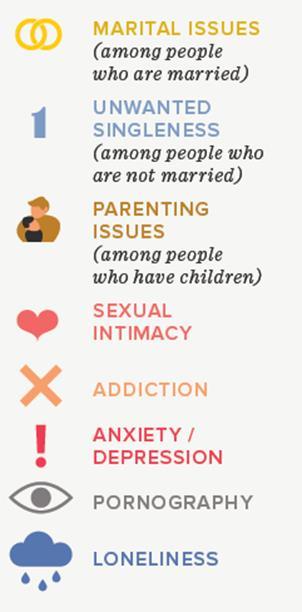
22/25 P.C.
25/28 P.C.
21/23 P.C.
29/25 P.C.
14/15 P.C.
40/34 P.C.
13/8 P.C.
32/29 P.C.
“…what relational and emotional burdens people are carrying around with them to work, to school, to the grocery store—and to church.”
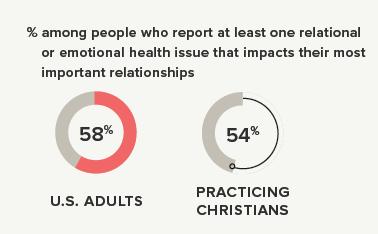
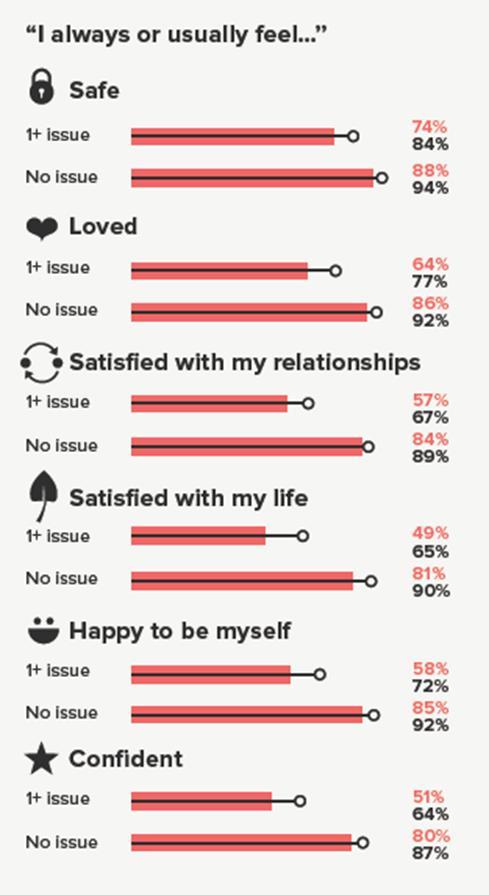
P.C.
P.C.
P.C.
P.C.
P.C.
P.C.
P.C.
P.C.
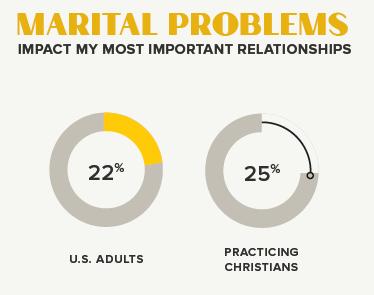
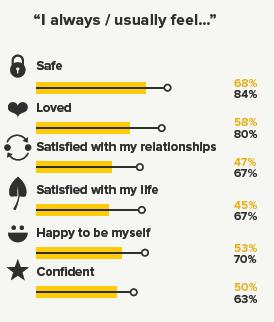
P.C.
P.C.
P.C.
P.C.
P.C.
P.C. P.C.
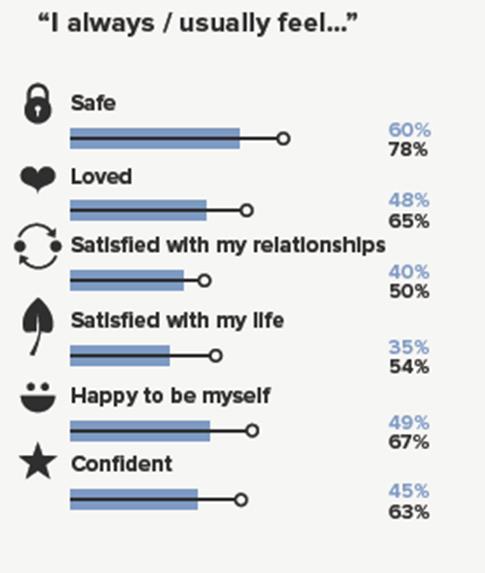
P.C.
P.C.
P.C.
P.C.
P.C.
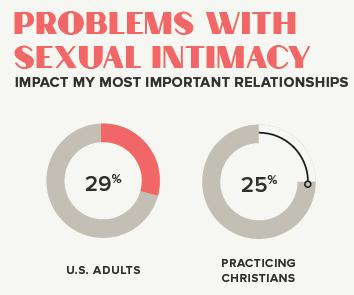

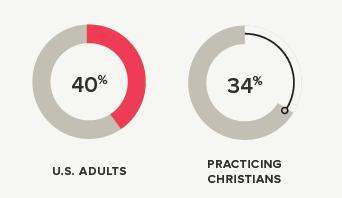
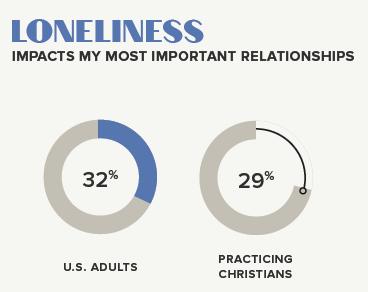
“…three out of four people are feeling pressure of some kind in their relationships.”
“Two in five U.S. adults and one-third of practicing Christians report they are dealing with anxiety or depression that has an impact on their significant relationships.”
“… anxiety (42% all U.S. adults), depression (39%), loneliness (32%), issues with sexual intimacy (29%), marriage problems (25%) and grief (25%) do have an effect. Parenting problems (21%) … addiction (13%) and pornography (8%)…”
“Christians are more likely than the general population to consider pornography a problem.”
“… be a part of their relational development?”
“First, authentic engagement.”
“Second, listening without judgment…”
“Churches can create spaces where it’s safe to ask questions…”
“The third thing is modeling. Young people are developing their viewpoint, their worldview, their faith.”
“I think three main factors are at work. The first is access to information.”
“Second, general awareness and cultural conversation.”
“Third, and related to that, is that anxiety and depression are kind of trendy. … anxiety and depression are kind of the thing to do right now.”
“The acknowledgement that mental health problems are real … It can be damaging, both emotionally and spiritually, for someone to grow up in a
space where experiencing mental illness is chalked up to a lack of faith. It can be damaging, both emotionally and spiritually, for someone to grow up in a space where experiencing mental illness is chalked up to a lack of faith.”
“The second way to help is for pastors and youth leaders to get informed.”
“The last thing is for ministry workers to recognize when they’ve reached the limits of their training and abilities.”
“If a young person comes to them with a problem, I think it’s healthy for a leader to say, ‘I don’t have the training to help you through this process. Let’s partner with someone who does.’”
“Parents and youth pastors need to get more inquisitive than directive when it comes to young people. Get curious. Ask questions. … so caught up in feeling responsible to give right answers to questions young people aren’t even asking. … Find out what their questions are.”
“41% of practicing Christian men ages 13 to 24 report seeking out porn at least once a month.” (Barna Group, The Porn Phenomenon (Ventura, CA: Barna, 2016).)
“Anxiety and depression are not feelings, but coping behaviors that a person resorts to when there are underlying violations around love (identity) and trust (safety).”
“I typically encourage pastors and other Christian leaders to do three things. First, make sure to have a good practice of self-care for your physical, emotional, mental and spiritual life.”
“Second, I encourage them to see a therapist or spiritual director— someone who is trained to understand them holistically who can provide a confidential and safe place for them to be themselves. A place where they don’t have to be the pastor or leader.”
“Third, I encourage them to have an intimate community of trusted friends where they don’t have to be pastor or ministry leader.”
“… the top reason given by practicing Christians who have distanced themselves from a church is:
1. “I felt I couldn’t be honest about myself and my life” (35%)
2. relational discord including disagreement with church teaching (17%)
3. disliking treatment by church leaders (15%)
4. disliking treatment by other congregants (16%)”
(“Restoring Relationships”, Barna, 2020, https://shop.barna.com/products/restoring-relationships)
Prevention Magazine lists 6 Ways to Feel Less Lonely and More Connected:
1. “Look up old friends. They probably want to catch up too.”
2. “Talk to strangers. Even 30 seconds of friendly conversation with a store clerk or cabdriver has a positive impact on mood.”
3. “Practice gratitude. Focus on things in your life that make you feel fortunate: your pets, perhaps, or a nice place to live…even a sunny day.”
4. “Exercise and get enough sleep. Both contribute to mood regulation and overall health.”
5. “Take a class. Sign up for something you’ve never tried, like dance, art, or meditation. Active learning exercises your brain, and you may make some new friends.”
6. “Volunteer. It’s hard to feel sorry for yourself when you’re helping improve the lives of others. Data shows that volunteering gives people purpose, which raises their self-esteem, in turn making them less lonely.”
(Jennifer Wolff, “Loneliness Is the Quiet Health Epidemic Impacting Your Heart, Brain and Longevity”, Prevention, November 25, 2019, https://www.prevention.com/health/mental-health/a29873388/lonelinessepidemic/)
Responding to Loneliness in the Church
“The loneliness epidemic creates an ideal opportunity for churches to prioritize fostering authentic community. Here are five ways we can push back loneliness with the power of the gospel.”
1. “Establish Belonging through Membership”
“When I was part of a team rethinking the membership process at Sojourn Church in Louisville, we decided to reframe church membership from merely a commitment to a place of belonging. I think the shift is important. Although calling for commitment is important, we found that appealing to our sporadic attendees” shared hunger for belonging to be a far more compelling invitation. Research has shown that belonging—not personal freedom or self-esteem or meaningful work or marriage and kids—is the most fundamental human need beyond food and shelter.”
“In church membership, we don’t simply say “I commit,” but also “I belong.” If new members are making public statements of commitment to the church, the church should likewise be making public statements of commitment to them. Early Christianity scholar Joseph Hellerman puts it well in When the Church Was a Family:”
“Spiritual formation occurs primarily in the context of community. People who remain contented with their brothers and sisters in the local church almost invariably grow in self-understanding, and they mature in their ability to relate in healthy ways to God and to their fellow human beings. This is especially the case for those courageous Christians who stick it out through the often-messy process of interpersonal discord and conflict resolution.” Long-term Interpersonal relationships are the crucible of genuine progress in the Christian life. People who stay grow.”
“Call people to commit, but also invite them to belong.”
2. “Prioritize Life-Giving Community”
“I’m an advocate of life-giving community groups. My heart isn’t simply for small groups that gather two or four times a month at someone’s house—
as great as that step is. My hope is that adults, teens, and children find rhythms of true community together. A small group is a people, not a time on the calendar. Healthy groups encourage, challenge, and support one another.”
“But while I’m all-in on community groups, I deeply believe there’s no one right way to cultivate community in a church. If your church currently provides community through Sunday school classes, midweek services, or community service ministries, cultivate community where it exists—and when necessary, start new ministries to promote deeper relationships.”
3. “Commit to Shared Leadership”
“When we ponder the influence of loneliness on the Western church, we can make sense of several other pressing challenges—the lack of truly diverse congregations and ministries, the moral and relational failures of many leaders, and so on. Many failures of leadership are first failures of relationship, accountability, and shared authority.”
“For the church to take loneliness seriously, we must question the “leaders are lonely” logic. While primary leadership of a congregation or organization is indeed a heavy burden, loneliness can be significantly mitigated by shared leadership. A healthy group of elders, staff, or team of volunteer leaders—and an engaged church membership—decreases the burden on any one pastor or leader, protecting everyone involved.”
4. “Teach on Friendship and Community”
“Although many churches rightly teach on marriage, parenting, and family issues, it seems rare for a church to do a deep sermon series on friendships and community. But the Old Testament highlights Israel’s
calling as a family, the friendship of David and Jonathan, and wisdom regarding friendship and loyalty. The New Testament provides a vision of Jesus’s intensely relational discipleship, the witness of the early church community in Acts, the “one another” commands in the epistles, and the hope of eternal fellowship at the end of the age.”
“Churches promote what they preach. The church that values friendship and community will leverage the pulpit to combat the loneliness epidemic.”
5. “Be Devoted to One Another”
“Western individualism has sparked unprecedented social isolation, so we need to work tirelessly to recover the biblical vision of human nature and community in our local churches.”
“Of course, this is hard work. That’s why Paul’s letters emphasize establishing healthy community in the local church through sacrificial relationships. By God’s grace, may we increasingly embody the call of Romans 12:10–13:”
“Be devoted to one another in love. Honor one another above yourselves. Never be lacking in zeal, but keep your spiritual fervor, serving the Lord. Be joyful in hope, patient in affliction, faithful in prayer. Share with the Lord’s people who are in need. Practice hospitality.”
(Jeremy Linneman, “How Your Church Can Respond to the Loneliness Epidemic”, August 14, 2020, https://www.thegospelcoalition.org/article/church-respond-lonelinessepidemic/)
Loneliness Scriptures:
• Genesis 2:18 • Psalm 25:16 • Timothy 4:9-12 • Numbers 11 • 1 Kings 18-19 • Psalm 37:1-4, 23-24 • Psalm 68:5-6 • Psalm 102 • Ecclesiastes 4:9-12 • Isaiah 26:3 • John 8:29, 14:1-27 • Timothy 4:16-18





